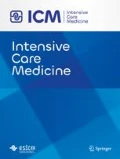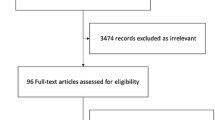Abstract
Purpose
To assess the effects of stress ulcer prophylaxis (SUP) versus placebo or no prophylaxis on all-cause mortality, gastrointestinal (GI) bleeding and hospital-acquired pneumonia in adult critically ill patients in the intensive care unit (ICU).
Methods
We performed a systematic review using meta-analysis and trial sequential analysis (TSA). Eligible trials were randomised clinical trials comparing proton pump inhibitors or histamine 2 receptor antagonists with either placebo or no prophylaxis. Two reviewers independently assessed studies for inclusion and extracted data. The Cochrane Collaboration methodology was used. Risk ratios/relative risks (RR) with 95 % confidence intervals (CI) were estimated. The predefined outcome measures were all-cause mortality, GI bleeding, and hospital-acquired pneumonia.
Results
Twenty trials (n = 1,971) were included; all were judged as having a high risk of bias. There was no statistically significant difference in mortality (fixed effect: RR 1.00, 95 % CI 0.84–1.20; P = 0.87; I 2 = 0 %) or hospital-acquired pneumonia (random effects: RR 1.23, 95 % CI 0.86–1.78; P = 0.28; I 2 = 19 %) between SUP patients and the no prophylaxis/placebo patients. These findings were confirmed in the TSA. With respect to GI bleeding, a statistically significant difference was found in the conventional meta-analysis (random effects: RR 0.44, 95 % CI 0.28–0.68; P = 0.01; I 2 = 48 %); however, TSA (TSA adjusted 95 % CI 0.18–1.11) and subgroup analyses could not confirm this finding.
Conclusions
This systematic review using meta-analysis and TSA demonstrated that both the quality and the quantity of evidence supporting the use of SUP in adult ICU patients is low. Consequently, large randomised clinical trials are warranted.




Similar content being viewed by others
References
Marik PE, Vasu T, Hirani A, Pachinburavan M (2010) Stress ulcer prophylaxis in the new millennium: a systematic review and meta-analysis. Crit Care Med 38(11):2222–2228. doi:10.1097/CCM.0b013e3181f17adf
Cook D, Heyland D, Griffith L, Cook R, Marshall J, Pagliarello J (1999) Risk factors for clinically important upper gastrointestinal bleeding in patients requiring mechanical ventilation. Canadian Critical Care Trials Group. Crit Care Med 27(12):2812–2817
Cook DJ, Fuller HD, Guyatt GH, Marshall JC, Leasa D, Hall R, Winton TL, Rutledge F, Todd TJ, Roy P et al (1994) Risk factors for gastrointestinal bleeding in critically ill patients. Canadian Critical Care Trials Group. N Engl J Med 330(6):377–381. doi:10.1056/NEJM199402103300601
Reintam Blaser A, Poeze M, Malbrain ML, Bjorck M, Oudemans-van Straaten HM, Starkopf J (2013) Gastrointestinal symptoms during the first week of intensive care are associated with poor outcome: a prospective multicentre study. Intensive Care Med 39(5):899–909. doi:10.1007/s00134-013-2831-1
Dellinger RP, Levy MM, Carlet JM, Bion J, Parker MM, Jaeschke R, Reinhart K, Angus DC, Brun-Buisson C, Beale R, Calandra T, Dhainaut JF, Gerlach H, Harvey M, Marini JJ, Marshall J, Ranieri M, Ramsay G, Sevransky J, Thompson BT, Townsend S, Vender JS, Zimmerman JL, Vincent JL (2008) Surviving Sepsis Campaign: international guidelines for management of severe sepsis and septic shock: 2008. Intensive Care Med 34(1):17–60. doi:10.1007/s00134-007-0934-2
Alhazzani W, Alenezi F, Jaeschke RZ, Moayyedi P, Cook DJ (2013) Proton pump inhibitors versus histamine 2 receptor antagonists for stress ulcer prophylaxis in critically ill patients: a systematic review and meta-analysis. Crit Care Med. doi:10.1097/CCM.0b013e3182758734
Rubulotta F, Gullo A, Iscra F (2007) Recommendations for ulcer prophylaxis in the treatment of patients with severe sepsis and septic shock: a dog chasing its tail? Intensive Care Med 33(4):718–720. doi:10.1007/s00134-007-0551-0
Krag M, Perner A, Wetterslev J, Moller MH (2013) Stress ulcer prophylaxis in the intensive care unit: is it indicated? A topical systematic review. Acta Anaesthesiol Scand. doi:10.1111/aas.12099
Lin PC, Chang CH, Hsu PI, Tseng PL, Huang YB (2010) The efficacy and safety of proton pump inhibitors vs histamine-2 receptor antagonists for stress ulcer bleeding prophylaxis among critical care patients: a meta-analysis. Crit Care Med 38(4):1197–1205. doi:10.1097/CCM.0b013e3181d69ccf
Higgins JPT, Green S (2012) Cochrane handbook for systematic reviews of interventions, version 5.1.0. Cochrane Collaboration, Oxford
Moher D, Liberati A, Tetzlaff J, Altman DG (2009) Preferred reporting items for systematic reviews and meta-analyses: the PRISMA statement. BMJ 339:b2535
Ciani O, Buyse M, Garside R, Pavey T, Stein K, Sterne JA, Taylor RS (2013) Comparison of treatment effect sizes associated with surrogate and final patient relevant outcomes in randomised controlled trials: meta-epidemiological study. BMJ 346:f457
Guyatt GH, Oxman AD, Kunz R, Atkins D, Brozek J, Vist G, Alderson P, Glasziou P, Falck-Ytter Y, Schunemann HJ (2011) GRADE guidelines: 2. Framing the question and deciding on important outcomes. J Clin Epidemiol 64(4):395–400. doi:10.1016/j.jclinepi.2010.09.012
Higgins JP, Thompson SG (2002) Quantifying heterogeneity in a meta-analysis. Stat Med 21(11):1539–1558. doi:10.1002/sim.1186
Wetterslev J, Thorlund K, Brok J, Gluud C (2009) Estimating required information size by quantifying diversity in random-effects model meta-analyses. BMC Med Res Methodol 9:86. doi:10.1186/1471-2288-9-86
Wetterslev J, Thorlund K, Brok J, Gluud C (2008) Trial sequential analysis may establish when firm evidence is reached in cumulative meta-analysis. J Clin Epidemiol 61(1):64–75. doi:10.1016/j.jclinepi.2007.03.013
Higgins JP, Whitehead A, Simmonds M (2011) Sequential methods for random-effects meta-analysis. Stat Med 30(9):903–921. doi:10.1002/sim.4088
Sweeting MJ, Sutton AJ, Lambert PC (2004) What to add to nothing? Use and avoidance of continuity corrections in meta-analysis of sparse data. Stat Med 23(9):1351–1375. doi:10.1002/sim.1761
Egger M, Davey Smith G, Schneider M, Minder C (1997) Bias in meta-analysis detected by a simple, graphical test. BMJ 315(7109):629–634
Apte NM, Karnad DR, Medhekar TP, Tilve GH, Morye S, Bhave GG (1992) Gastric colonization and pneumonia in intubated critically ill patients receiving stress ulcer prophylaxis: a randomized, controlled trial. Crit Care Med 20(5):590–593
Basso N, Bagarani M, Materia A, Fiorani S, Lunardi P, Speranza V (1981) Cimetidine and antacid prophylaxis of acute upper gastrointestinal bleeding in high risk patients. Controlled, randomized trial. Am J Surg 141(3):339–341 0002-9610(81)90191-4
Ben-Menachem T, Fogel R, Patel RV, Touchette M, Zarowitz BJ, Hadzijahic N, Divine G, Verter J, Bresalier RS (1994) Prophylaxis for stress-related gastric hemorrhage in the medical intensive care unit. A randomized, controlled, single-blind study. Ann Intern Med 121(8):568–575
Burgess P, Larson GM, Davidson P, Brown J, Metz CA (1995) Effect of ranitidine on intragastric pH and stress-related upper gastrointestinal bleeding in patients with severe head injury. Dig Dis Sci 40(3):645–650
Darlong V, Jayalakhsmi TS, Kaul HL, Tandon R (2003) Stress ulcer prophylaxis in patients on ventilator. Trop Gastroenterol 24(3):124–128
Friedman CJ, Oblinger MJ, Suratt PM, Bowers J, Goldberg SK, Sperling MH, Blitzer AH (1982) Prophylaxis of upper gastrointestinal hemorrhage in patients requiring mechanical ventilation. Crit Care Med 10(5):316–319
Groll A, Simon JB, Wigle RD, Taguchi K, Todd RJ, Depew WT (1986) Cimetidine prophylaxis for gastrointestinal bleeding in an intensive care unit. Gut 27(2):135–140
Halloran LG, Zfass AM, Gayle WE, Wheeler CB, Miller JD (1980) Prevention of acute gastrointestinal complications after severe head injury: a controlled trial of cimetidine prophylaxis. Am J Surg 139(1):44–48 0002-9610(80)90228-7
Hanisch EW, Encke A, Naujoks F, Windolf J (1998) A randomized, double-blind trial for stress ulcer prophylaxis shows no evidence of increased pneumonia. Am J Surg 176(5):453–457 S0002961098002396
Kantorova I, Svoboda P, Scheer P, Doubek J, Rehorkova D, Bosakova H, Ochmann J (2004) Stress ulcer prophylaxis in critically ill patients: a randomized controlled trial. Hepatogastroenterology 51(57):757–761
Karlstadt RG, Iberti TJ, Silverstein J, Lindenberg L, Rright-Asare P, Rockhold F, Young MD (1990) Comparison of cimitidine and placebo for the prophylaxis of upper gastrointestinal bleeding due to stress-related gastric mucosal damage in the intensive care unit. J Intensive Care Med 5:26–32
Macdougall BR, Bailey RJ, Williams R (1977) H2-receptor antagonists and antacids in the prevention of acute gastrointestinal haemorrhage in fulminant hepatic failure. Two controlled trials. Lancet 1(8012):617–619 S0140-6736(77)92055-4
Martin LF, Booth FV, Karlstadt RG, Silverstein JH, Jacobs DM, Hampsey J, Bowman SC, D’Ambrosio CA, Rockhold FW (1993) Continuous intravenous cimetidine decreases stress-related upper gastrointestinal hemorrhage without promoting pneumonia. Crit Care Med 21(1):19–30
Metz CA, Livingston DH, Smith JS, Larson GM, Wilson TH (1993) Impact of multiple risk factors and ranitidine prophylaxis on the development of stress-related upper gastrointestinal bleeding: a prospective, multicenter, double-blind, randomized trial. The Ranitidine Head Injury Study Group. Crit Care Med 21(12):1844–1849
Peura DA, Johnson LF (1985) Cimetidine for prevention and treatment of gastroduodenal mucosal lesions in patients in an intensive care unit. Ann Intern Med 103(2):173–177
Powell H, Morgan M, Li SK (1993) Inhibition of gastric acid secretion in the intensive care unit after coronary artery bypass graft. A pilot control study of intravenous omeprazole by bolus and infusion, ranitidine and placebo. Theor Surg 8:125–130
Reusser P, Gyr K, Scheidegger D, Buchmann B, Buser M, Zimmerli W (1990) Prospective endoscopic study of stress erosions and ulcers in critically ill neurosurgical patients: current incidence and effect of acid-reducing prophylaxis. Crit Care Med 18(3):270–274
Ruiz-Santana S, Ortiz E, Gonzalez B, Bolanos J, Ruiz-Santana AJ, Manzano JL (1991) Stress-induced gastroduodenal lesions and total parenteral nutrition in critically ill patients: frequency, complications, and the value of prophylactic treatment. A prospective, randomized study. Crit Care Med 19(7):887–891
van den Berg B, van Blankenstein M (1985) Prevention of stress-induced upper gastrointestinal bleeding by cimetidine in patients on assisted ventilation. Digestion 31(1):1–8
Zinner MJ, Zuidema GD, Smith P, Mignosa M (1981) The prevention of upper gastrointestinal tract bleeding in patients in an intensive care unit. Surg Gynecol Obstet 153(2):214–220
Calvet X, Baigorri F, Duarte M, Saura P, Royo C, Joseph D, Mas A, Artigas A (1998) Effect of ranitidine on gastric intramucosal pH in critically ill patients. Intensive Care Med 24(1):12–17
Gursoy O, Memis D, Sut N (2008) Effect of proton pump inhibitors on gastric juice volume, gastric pH and gastric intramucosal pH in critically ill patients: a randomized, double-blind, placebo-controlled study. Clin Drug Investig 28(12):777–782 28125
Chan KH, Lai EC, Tuen H, Ngan JH, Mok F, Fan YW, Fung CF, Yu WC (1995) Prospective double-blind placebo-controlled randomized trial on the use of ranitidine in preventing postoperative gastroduodenal complications in high-risk neurosurgical patients. J Neurosurg 82(3):413–417. doi:10.3171/jns.1995.82.3.0413
Cheadle WG, Vitale GC, Mackie CR, Cuschieri A (1985) Prophylactic postoperative nasogastric decompression. A prospective study of its requirement and the influence of cimetidine in 200 patients. Ann Surg 202(3):361–366
Zhang Z, Xu X, Ni H (2013) Small studies may overestimate the effect sizes in critical care meta-analyses: a meta-epidemiological study. Crit Care 17(1):R2. doi:10.1186/cc11919
Thorlund K, Imberger G, Walsh M, Chu R, Gluud C, Wetterslev J, Guyatt G, Devereaux PJ, Thabane L (2011) The number of patients and events required to limit the risk of overestimation of intervention effects in meta-analysis–a simulation study. PLoS One 6(10):e25491. doi:10.1371/journal.pone.0025491
Guyatt GH, Oxman AD, Vist GE, Kunz R, Falck-Ytter Y, Alonso-Coello P, Schunemann HJ (2008) GRADE: an emerging consensus on rating quality of evidence and strength of recommendations. BMJ 336(7650):924–926. doi:10.1136/bmj.39489.470347.AD
Cook DJ, Reeve BK, Guyatt GH, Heyland DK, Griffith LE, Buckingham L, Tryba M (1996) Stress ulcer prophylaxis in critically ill patients. Resolving discordant meta-analyses. JAMA 275(4):308–314
Barkun AN, Bardou M, Pham CQ, Martel M (2012) Proton pump inhibitors vs. histamine 2 receptor antagonists for stress-related mucosal bleeding prophylaxis in critically ill patients: a meta-analysis. Am J Gastroenterol 107(4):507–520. doi:10.1038/ajg.2011.474
Conflicts of interest
None.
Author information
Authors and Affiliations
Corresponding author
Additional information
Systematic review registration
The International Prospective Register of Systematic Reviews (PROSPERO), No. CRD42013004142.
Electronic supplementary material
Below is the link to the electronic supplementary material.
Rights and permissions
About this article
Cite this article
Krag, M., Perner, A., Wetterslev, J. et al. Stress ulcer prophylaxis versus placebo or no prophylaxis in critically ill patients. Intensive Care Med 40, 11–22 (2014). https://doi.org/10.1007/s00134-013-3125-3
Received:
Accepted:
Published:
Issue Date:
DOI: https://doi.org/10.1007/s00134-013-3125-3




